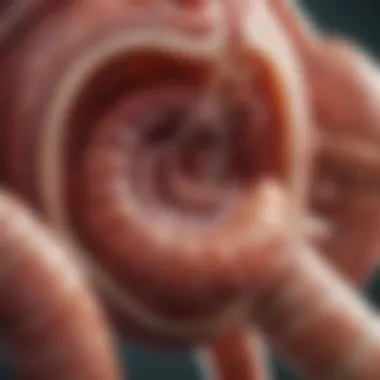Shrimp Consumption and Its Impact on Urinary Health


Overview of Research Topic
Brief Background and Context
Shrimp is widely regarded as a delicious and nutritious seafood choice. Many folks enjoy it grilled, boiled, or stir-fried, and it’s rich in proteins, vitamins, and minerals. Despite its popularity, the potential health implications of consuming shrimp have not been thoroughly investigated in relation to certain health issues, such as urinary tract infections (UTIs). UTIs are reasonably common, especially among women, and can lead to significant discomfort and health complications if not treated promptly. The intersection of these two topics, shrimp consumption and UTIs, beckons a closer look, as the nuances involved can inform dietary recommendations and personal choices.
Crucial factors might include the nutritional makeup of shrimp, its potential contaminants, and how various cooking methods can impact its health benefits. Understanding how these elements connect to urinary health is necessary for both consumers and medical professionals.
Importance in Current Scientific Landscape
The scientific community has recently spotlighted the role of diet in several aspects of health, particularly in its preventative capabilities. With shifts in dietary habits and an increased consumption of seafood, understanding how foods like shrimp may contribute to or mitigate health issues has never been more relevant. Furthermore, the scrutiny of dietary patterns and their influence on various infections sheds light on public health strategies – particularly those focused on nutrition education. This investigation serves not just to clarify potential risks but also to underscore the significance of informed dietary choices in promoting urinary health.
Methodology
Research Design and Approach
In examining the connection between shrimp consumption and UTIs, a thorough review of existing literature serves as a cornerstone of this exploration. This approach incorporates a mix of observational studies, dietary analyses, and clinical research focused on the relationship between diet and urinary health. By integrating varied sources, including peer-reviewed journals and nutrient databases, this investigation seeks to paint a well-rounded picture of the implicated factors.
Data Collection Techniques
Data collection involved analyzing dietary surveys and trends, along with a systematic review of studies examining the effects of shrimp and other seafood on urinary tract infections. This included:
- Survey Data: Gathering data from dietary surveys conducted in multiple demographic populations to identify shrimp consumption patterns.
- Clinical Studies: A review of studies linking seafood intake with urinary health outcomes, specifically focusing on incidence rates of UTIs in varied dietary contexts.
- Nutritional Profiles: Evaluating the biochemical composition of shrimp and its potential to affect urine pH, bacterial growth, and overall urinary function.
By analyzing these diverse streams of data, the study aims to deduce a clearer line of reasoning connecting shrimp and UTIs, exploring both direct and indirect pathways of influence.
"Nutrition is not only essential for a healthy life but also a pivotal piece in the puzzle of chronic diseases, including urinary infections."
The eventual goal is to knit together dietary habits with health outcomes, potentially guiding future research directions and shaping public dietary recommendations.
Preamble to Urinary Tract Infections
Understanding urinary tract infections (UTIs) is crucial in the context of health and nutrition, particularly as they affect millions globally. This section will set the stage for analyzing how dietary habits, like shrimp consumption, could intertwine with these common infections. By delving into UTIs, their impact on overall health, and their potential links to our diets, we can unravel the complex web connecting what we eat to how our bodies react. This exploration aims to shed light on a niche yet significant aspect of health that deserves our attention and understanding.
Defining Urinary Tract Infections
Urinary tract infections are primarily a result of bacteria entering the urinary system, causing inflammation and discomfort. This infection can affect any part of the urinary system, which includes the kidneys, ureters, bladder, and urethra. The most common form of UTI is cystitis, often characterized by symptoms such as a burning sensation during urination, frequent urge to urinate, and cloudy urine. Understanding these basics provides a foundation for further discussing how dietary elements, particularly shrimp, might influence these infections.
Common Causes and Risk Factors
The causes of UTIs often revolve around bacterial invasion. However, several factors contribute to an individual's susceptibility to these infections:
- Personal hygiene: Inadequate cleaning after bathroom visits can introduce bacteria into the urinary system, increasing the likelihood of infection.
- Sexual activity: This can introduce bacteria from surrounding areas into the urethra, particularly in women, making them more prone to UTIs.
- Diabetes: Elevated sugar levels can alter the urine's environment, enabling bacteria to thrive.
- Anatomy: Women are typically at higher risk for UTIs due to their shorter urethras, which makes it easier for bacteria to reach the bladder.
- Diet: Certain foods and drinks may also influence UTI occurrence. It's here we start to link back to the dietary focus of this article, particularly how the consumption of shrimp and other seafood may play a role in this narrative.
In summary, urinary tract infections not only pose health challenges but also prompt critical inquiries into the role of diet and nutrition. The substances we consume could either bolster our defenses or weaken them against such infections, making understanding this relationship vital.


The Role of Diet in Health
Diet plays a pivotal role in maintaining overall health, influencing everything from metabolic processes to disease susceptibility. As we explore the intricacies of shrimp consumption and its association with urinary tract infections (UTIs), it is vital to examine how various dietary components can either bolster the body's defenses or leave it vulnerable.
The choices we make about what to eat can affect our urinary health significantly. Understanding the role of diet, particularly seafood, in our everyday life unveils important insights that contribute to our understanding of UTIs. Nutritional habits are not merely aspects of lifestyle; they can become critical determinants of health outcomes. For instance, the nutrients found in specific foods may help fight off bacteria that contribute to infections, while other dietary choices may promote their growth.
Understanding Dietary Impact on Infections
The impact of diet on infections is multifaceted. Essentially, the foods we consume can shape our immune system and the microbiome in our gut, which are both essential for preventing diseases. For instance, a diet rich in fruits and vegetables often contains antioxidants and essential vitamins that enhance immune function. Conversely, an imbalance, such as those found in diets high in processed foods or sugars, may lead to inflammation and alter the microbiota in ways that create a favorable environment for pathogens.
"Healthy eating not only fuels your body but also strengthens your defenses against potential infections."
When focusing on UTIs specifically, some studies suggest that certain dietary choices can increase the likelihood of these infections. For example, overly sugary or high-fat diets might influence the pH of urine and impact how bacteria flourish in the urinary tract, potentially raising susceptibility to infections. Here are a few dietary considerations that may influence urinary health:
- Hydration: Staying sufficiently hydrated helps in flushing out bacteria and preventing them from adhering to the urinary tract.
- Balanced Nutrients: Including a well-rounded selection of nutrients that support a strong immune system.
- Antimicrobials in Diet: Foods with natural antifungal and antibacterial properties can be beneficial.
Exploring Seafood in the Human Diet
Seafood is an integral part of many cultures and provides a rich source of essential nutrients. With shrimp being one of the more popular options, it is wise to scrutinize how this type of seafood interacts with our health. Rich in protein and omega-3 fatty acids, shrimp can contribute positively to one's diet when consumed in moderation. Omega-3s, in particular, have anti-inflammatory properties that may assist in combating infections.
However, it is crucial to approach seafood consumption mindfully. The harvesting methods, quality of the shrimp, and the presence of potential contaminants can also play a significant role in their health benefits. Several factors can influence the impacts of seafood on health, including:
- Sustainability: Choosing responsibly sourced shrimp to avoid chemicals that might harm health.
- Nutritional Quality: Fresh shrimp versus frozen options can yield different nutrient profiles.
- Allergenic Reactions: For some, consuming shrimp could lead to allergic responses, impacting overall health and potentially increasing susceptibility to infections.
Through careful consideration of dietary elements, especially with regard to seafood, we can begin to understand how certain foods like shrimp may relate to urinary tract infections. It is a nuanced interaction and necessitates further exploration to tease apart the specifics.
Shrimp: Nutritional Profile and Benefits
Shrimp, often celebrated for its delicate taste and versatility in dishes worldwide, packs quite a nutritional punch. Its profile is not only about taste but also about what these small crustaceans bring to the table regarding health benefits. In the context of urinary tract infections (UTIs), understanding the nutritional elements in shrimp is essential because they might play a role in either promoting health or causing potential complications. This section will delve deep into the vitamins, minerals, and other key components contained in shrimp, shedding light on both their advantages and the considerations to keep in mind.
Vitamins and Minerals in Shrimp
Shrimp is a treasure trove of nutrients. A typical serving can offer a range of vitamins and minerals, particularly noteworthy include:
- Vitamin B12: This vitamin is crucial for maintaining proper nerve function and the forming of blood cells. A deficiency can lead to serious health issues.
- Selenium: Known for its antioxidant properties, selenium supports the immune system and helps prevent cellular damage.
- Phosphorus: Essential for bone health, phosphorus works alongside calcium, and shrimp can be a good source for those looking to boost their intake.
While enriching, it’s also important to note that the preparation of shrimp can impact these nutrient levels. For instance, breaded and fried shrimp may lose its vitamin content through oil absorption during cooking.
The Role of Omega-3 Fatty Acids
Omega-3 fatty acids often steal the spotlight in discussions about healthy eating, and rightly so. Shrimp are a decent source of these fats, which are vital for numerous bodily functions. Omega-3s have been linked to reduced inflammation, which may play a role in urinary tract health. Chronic inflammation is a risk factor for various conditions, including infections. Adding shrimp to a diet rich in these healthy fats could help promote a more balanced inflammatory response.
The primary omega-3s found in shrimp are EPA and DHA. Their presence assists in:
- Heart Health: Omega-3s contribute to better cardiovascular function, thereby promoting overall health.
- Cognitive Function: There is research suggesting that these fatty acids are beneficial for brain health as well.
- Joint Health: By reducing inflammation, omega-3s can help maintain joint integrity and mobility.
Potential Allergenic Reactions


Despite their numerous benefits, shrimp also carries a darker side, specifically when it comes to allergies. Shrimp, much like other shellfish, is a common allergen and can provoke severe reactions in certain individuals. Symptoms can range from mild hives to life-threatening anaphylaxis. Understanding the potential for allergic reactions is crucial for anyone considering including shrimp in their diet, particularly if they have a known shellfish allergy.
Interestingly, some studies suggest that specific allergens present in shrimp may exacerbate inflammation, which could ultimately impact urinary health. It emphasizes the importance of personalized dietary choices—what works for one might not for another.
In summary, shrimp boasts a rich nutritional profile that could offer health benefits, particularly in regulating inflammation and delivering vital nutrients. Yet, the risk of allergic reactions mustn't be overlooked. Understanding these nuances is crucial for making informed dietary choices.
Overall, shrimp serves as both a flavorful ingredient and a significant source of several essential nutrients. However, the implications regarding allergic reactions and their effects on health, particularly concerning UTIs, necessitate a thoughtful approach to inclusion in one’s diet.
Existing Research on Shrimp and UTIs
The intersection of shrimp consumption and urinary tract infections (UTIs) is an area that requires meticulous attention. With seafood being a staple in many diets, understanding its potential role in health matters, especially concerning UTIs, is critical. Research surrounding the relationship between diet and health outcomes not only helps pinpoint at-risk populations but also guides nutritional recommendations profoundly. The existing studies serve as stepping stones toward grasping how specific dietary choices—like the consumption of shrimp—might influence urinary infections.
The significance of these studies lies in their ability to highlight not only the pattern of UTI occurrences but also other underlying health factors. This brings forth a more comprehensive view of how intertwined modern dietary habits and health issues can be. Knowledge of previous research can illuminate potential dietary adjustments that might mitigate risk, putting the power back in individuals' hands to make informed choices.
Literature Review: Studies Related to Diet and UTIs
A variety of investigations have aimed to discern the relationship between dietary intake and UTI prevalence. Much of the existing literature examines the broader category of diets and UTIs, but several studies have specifically looked at seafood, including shrimp, as a focal point.
For instance, one study published in a reputable health journal pointed out that high-protein diets might correlate with elevated UTI risks. However, this does not universally apply. Different protein sources can exert varying impacts on urinary health due to their unique biochemical compositions. In this light, shrimp has been under scrutiny.
- Examining Dietary Proteins:
- Research shows proteins from fish and shellfish might influence inflammation levels differently than red meat.
- The presence of certain fats in shrimp may also emerge as a factor in UTI risk.
Another piece of research examined participants' dietary habits, revealing those who consumed larger amounts of shrimp reported fewer incidences of UTIs compared to those who primarily relied on processed meat.
Potential Correlations Found in Recent Studies
Recent inquiries into the correlation between shrimp and UTIs have yielded intriguing insights. One compelling point of debate revolves around dietary cholesterol. Shrimp is known for its relatively high cholesterol content, which raises questions about its impact on inflammation—a known aggravator of UTIs. Some researchers argue that moderate consumption may instead provide benefits due to the nutrients found in shrimp, such as vitamin B12 and omega-3 fatty acids, both of which play significant roles in maintaining overall health.
- Increased Antioxidant Properties: Some studies have noted that frequent shrimp eaters displayed higher antioxidant levels than others, potentially suggesting a protective effect against bacteria that cause UTIs.
- Inflammation and Response: A few recent studies indicated that shrimp consumption might promote a healthy inflammatory response, crucial in lowering UTI risk. This shifts the conversation toward understanding how balance plays a key role in dietary decisions.
Possible Mechanisms Linking Shrimp to UTIs
The connection between shrimp consumption and urinary tract infections (UTIs) might not seem apparent at first glance. However, understanding the underlying mechanisms is critical. Identifying how shrimp might influence UTI risk can offer valuable insights into dietary impacts on urinary health. This section investigates two primary concepts—dietary cholesterol and bacterial growth promotion.
The Impact of Dietary Cholesterol
Shrimp is renowned for its high cholesterol content. While cholesterol often gets a bad rap, it plays a multifaceted role in our diet. Concerns arise when high levels in the blood are considered, as they might contribute to various health issues.
- Cholesterol and Inflammation: Elevated cholesterol can exacerbate inflammatory responses in the body. Chronic inflammation has emerged as a contributor to numerous infections, potentially including UTIs. Inflammation might create an environment conducive for bacteria, therefore raising the stakes for infection.
- Gut Microbiome Balance: Cholesterol also impacts our gut microbiome. An imbalance in gut flora can lead to dysbiosis, an alteration linked to increased susceptibility to infections. If bacterial populations shift unfavorably, the door may open wider for pathogens causing UTIs.
Though shrimp offers several nutritional benefits, the cholesterol content warrants a closer look for those concerned with UTI risk. Balancing shrimp consumption while maintaining a healthy diet could be crucial for urinary health.
Bacterial Growth Promotion: Is There a Link?


Another angle worth examining is whether shrimp consumption could inadvertently promote bacterial growth that leads to UTIs. Research surrounding this subject is still evolving.
- Microbial Contamination: Seafood, including shrimp, can harbor various bacteria. If not prepared or handled correctly, these bacteria may enter the urinary tract, leading to infections. Vibrio species common in marine environments can influence gut flora and potentially contribute to UTI risk.
- Nutrient Riche Environment: The nutrients in shrimp, particularly proteins and certain fats, could create a supportive environment for harmful bacteria. As the body metabolizes these compounds, waste products may provide the sustenance some uropathogens need to flourish within the urinary tract.
In summary, while shrimp is often enjoyed for its taste and nutritional profile, potential connections to UTI risks could arise from both dietary cholesterol and bacterial growth facilitation. Both need further exploration to understand their implications better.
"Understanding dietary choices is vital for evaluating their health impacts, especially for susceptible populations."
By increasing awareness of these mechanisms, individuals can make informed decisions regarding shrimp consumption. This helps not only in mitigating UTI risks but also in enhancing overall wellbeing.
Prevention Strategies for UTIs
Urinary tract infections (UTIs) can be uncomfortable and frustrating. Thus, understanding how to prevent them is vital. Prevention strategies are multi-faceted, focusing on adjusting dietary habits and understanding the role of hydration. Both elements can serve as protective measures against infections that can affect anyone, but especially those prone to recurrent UTIs.
Dietary Adjustments and Nutritional Recommendations
The food we eat plays a significant role in our overall health, including our urinary system. Making informed dietary adjustments can be a preventive measure against UTIs. Some key considerations include:
- Increased Intake of Antioxidants: Foods rich in antioxidants, like berries, oranges, and green leafy vegetables, help combat inflammation. This reduction in inflammation can make the urinary tract less hospitable to bacteria.
- Incorporation of Probiotics: Yogurt and fermented foods might be beneficial due to their positive influence on the stomach and urinary health. They can help maintain a balanced gut flora, which is essential for overall infection resistance.
- Limiting Sugary and Processed Foods: High sugar diets can create a breeding ground for bacteria. Reducing the intake of refined sugars and processed snacks may minimize this risk.
- Exploration of Omega-3 Fatty Acids: Omega-3 has anti-inflammatory properties and can be found in fish such as salmon, along with flaxseeds and walnuts. Including these in your diet might bolster the immune system.
"Diet can be a game changer, influencing not just nutrition but overall well-being, particularly in preventing infections."
By being conscientious about food choices, individuals can lay the groundwork for a healthier urinary system.
Hydration and Its Role in Urinary Health
Aside from dietary changes, hydration is another crucial aspect of preventive strategies. Drinking an adequate amount of fluids, particularly water, ensures that the urinary tract remains flushed and bacteria are less likely to take hold. Important points regarding hydration include:
- Flushing Mechanism: Adequate fluid intake dilutes the urine and increases urination frequency, making it less likely for bacteria to grow. Think of it as giving your urinary tract a good rinse.
- Avoiding Irritants: Staying hydrated helps mitigate the effects of bladder irritants such as caffeine and alcohol, which can increase irritation and urgency. Water can counterbalance these effects.
- Daily Requirements: While the common recommendation is to aim for eight 8-ounce glasses a day, individual needs can differ. Factors like physical activity, climate, and overall health should guide fluid intake.
Incorporating these strategies into daily life may help mitigate the risk of UTIs, promoting long-term urinary health. Understanding the connection between what you consume and urinary tract wellness underscores the importance of thoughtful dietary choices and sufficient hydration.
Epilogue: Understanding the Complex Relationship
Exploring the connection between shrimp consumption and urinary tract infections (UTIs) is not just a passing curiosity; it’s a multifaceted issue that warrants careful consideration. Understanding this relationship can shed light on dietary choices that may influence urinary health. The topic, while seemingly straightforward, involves layers of scientific inquiry, ranging from nutritional aspects to microbiome interactions.
The significance of this discussion is underscored by the prevalence of UTIs, which affects millions globally. Given that diet often plays a pivotal role in health, mapping out the nuances of how shrimp may contribute or detract from urinary tract issues is crucial. This article builds on existing research and encourages readers to think critically about the foods they consume. Not to mention that understanding the what and why behind shrimp and UTIs could lead to beneficial dietary adjustments.
Summarizing Key Findings
Throughout the article, several key points emerge:
- Nutritional Profile: Shrimp is rich in nutrients and low in calories, making it a popular choice in many diets. However, it’s crucial to consider how these nutrients interact with our body, particularly in relation to urinary health.
- Influence of Omega-3 Fatty Acids: The presence of omega-3s in shrimp sheds light on their potential role in reducing inflammation, which could have implications for UTI susceptibility.
- Bacterial Growth Concerns: There's potential for shrimp to harbor bacteria if it's not cooked or handled properly, highlighting the importance of food safety.
- Dietary Considerations: Other dietary components that work in conjunction with shrimp also need attention; it’s not just about one food item, but how it fits into the larger picture of a person’s diet.
These findings suggest a delicate balance in dietary choices, emphasizing that no single food is universally good or bad.
Future Research Directions Needed
Moving forward, the exploration of shrimp and its link to UTIs raises many questions that merit deeper investigation:
- Longitudinal Studies: More extensive studies over time are needed to comprehend the long-term effects of shrimp consumption on urinary tract health.
- Microbiome Investigations: Delving into how shrimp affects gut and urinary microbiomes could reveal hidden connections and mechanisms that contribute to UTIs.
- Comparative Studies: It would be valuable to compare shrimp with other seafood to establish whether certain types have differing impacts on urinary health.
- Allergic Reactions and Sensitivities: Given that some individuals may have allergies, further research could explore how these reactions influence UTI occurrences.
Ultimately, bridging the existing gaps in knowledge will provide clearer guidance for healthcare professionals and individuals alike. Understanding the complex relationship between diet and health is an ongoing journey, one that continues to unfold with advancements in research and technology.



